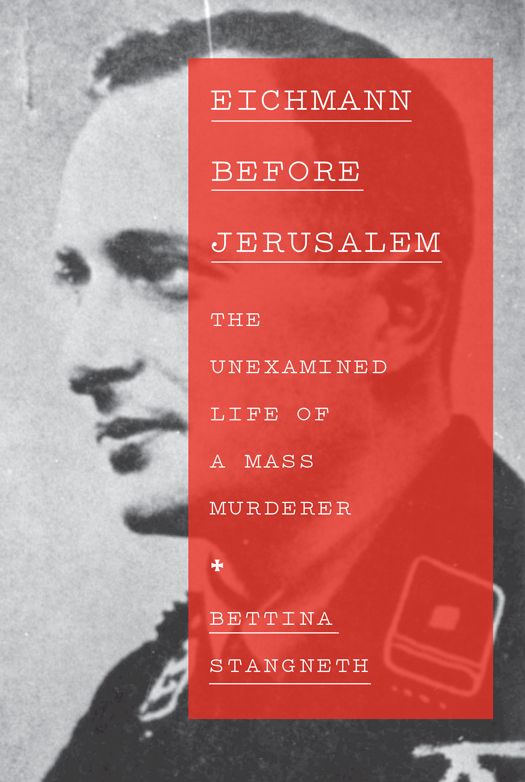
Eichmann Before Jerusalem
The Unexamined Life of a Mass Murderer
کتاب های مرتبط
- اطلاعات
- نقد و بررسی
- دیدگاه کاربران
نقد و بررسی

July 28, 2014
German philosopher and historian Stangneth provides plenty of evidence to dispel Adolf Eichmann’s cowardly testimony at his 1961 trial in Jerusalem, where he claimed he was simply a “small cog in Adolf Hitler’s extermination machine.” The gossip surrounding Eichmann during WWII and his subsequent escape to Argentina proves otherwise, Stangneth shows, as she maps out Eichmann’s post-war years and his careful management of his own persona. Eichmann had quickly gained the title of the “Czar of the Jews” while working within the Third Reich bureaucracy; his calculated dealings with the Jewish communities in Austria, Poland, and Hungary brought him in contact with many Jewish leaders who spread word of his monstrous actions to their respective communities. Stangneth writes with clarity and determination, allowing the overwhelming evidence to drive her theory that Adolf Eichmann was “clearly someone who was out to ‘create’ a verdict rather than reach one.” Thrilling in its purpose, Stangneth paints a portrait very different from the banality of “Eichmann in Jerusalem” Hannah Arendt reported on in 1961. This work is daunting, but there is no doubt of its importance: Stangneth’s research, full of forgotten papers, lost interviews, and buried evidence, turns the conventional wisdom about Eichmann on its head.

Starred review from July 1, 2014
A riveting reconstruction of a fanatical National Socialist's obdurate journey in exile and appalling second career in Argentina.Delving into a body of interviews Adolf Eichmann (1906-1962) made with pro-Nazi Dutch war propagandist Willem Sassen in Argentina in the late 1950s, German historian Stangneth reveals the chilling mindset of the unrepentant Nazi, later carefully disguised at his trial in Israel. Eichmann's Argentine writings and interviews were not available to Hannah Arendt when she wrote her brilliant Eichmann in Jerusalem (1963). In it, she portrays the wretched former SS colonel on trial for his life in 1961 as "just a small cog in Adolf Hitler's extermination machine" (his self-description), with none of the terrifying look of evil that an efficient engineer of the Final Solution should have displayed. Stangneth meticulously reveals how Eichmann was able to fool everyone, employing a cunning mixture of self-aggrandizement and opportunism, even during his early SS career in Austria when he was put in charge of Jewish affairs and was known as the "Czar of the Jews." Eichmann was proud of being a man of importance, and at the end of the war, he reluctantly had to disguise himself among other displaced persons, eluding Allied capture and living for several years incognito in northern Germany as a chicken farmer. Successfully floating rumors that he had taken up with the Palestinian mufti, he threw Nazi hunters off his trail, and he was able to flee to Argentina effortlessly and with the aid of a ferocious coterie of exiled Nazis comfortably ensconced there. Stangneth masterfully sifts through the information from these lively social gatherings conducted at journalist Sassen's home three years before Eichmann's kidnapping by Israeli agents.A rigorously documented, essential work not only about Eichmann's masterly masquerade, but also about how we come to accept appearances as truth.
COPYRIGHT(2014) Kirkus Reviews, ALL RIGHTS RESERVED.

Starred review from September 1, 2014
German historian Stangneth examines Holocaust architect Adolf Eichmann's postwar activities and compellingly argues that conventional views of the unrepentant Nazi as a pencil-pushing bureaucrat fall far short of the truth. Eichmann initially kept a low profile, hiding in a northern German forest, but in escaping to Argentina in 1950, he found relative safety and a community of exiled Nazis with whom he could use his real name. But, shows Stangneth, Eichmann had always been a proud man, and soon his longing for recognition, as well as his delusional hope of a return to power in a reformulated Nazi movement, led him to be open about his past. He wrote memoirs and an unpublished novel about his experiences. He drafted an open letter to Chancellor Konrad Adenauer offering to educate young Germans about Nazism. And, most significantly, he conversed freely with many interlocutors, including Willem Sassen, a Dutch sympathizer who interviewed him at length about his role in organizing the deportation and murder of millions of Jews. Awaiting trial in Israel, he changed his story, but even then, he still sought to draw the gaze of powerful people and make the world see him as an indispensable specialist, a historian, a philosopher, and finally a prophet. And if Eichmann's efforts to manage his reputation largely failed, Stangneth suggests that Eichmann at least succeeded in misleading Hannah Arendt, who, struggling with how to get her mind around the evil of Nazism as a whole, expected Eichmann to be a banal bureaucrat, and allowed her expectations to be fulfilled. Debates over Arendt continue, but this beautifully thorough account succeeds in reminding us that our longing to understand the nature of evil should not distract us from the historical record.(Reprinted with permission of Booklist, copyright 2014, American Library Association.)

























دیدگاه کاربران